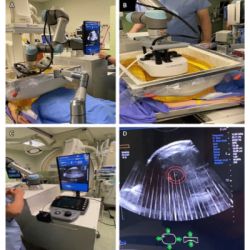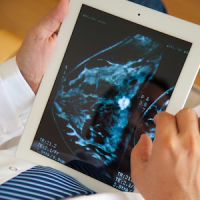The importance of artificial intelligence (AI) is ever increasing in healthcare, especially in enhancing the accuracy of diagnostic tools and disease risk predictive models. Radiology is said to be among the medical specialities most primed to incorporate AI into clinician workflow. It's no wonder that conversations about AI replacing radiologists are ubiquitous in the popular media.
Such negative perceptions about AI are affecting how medical students view the field of radiology as a career choice, according to a recent study published by Gong et al. This national survey study assessed the influence of AI on Canadian medical students' preference for radiology speciality. More than half (56.4%) of the surveyed students interested in the field felt “worried” in considering radiology as a career, with an additional 16% of students entirely abandoning radiology as their first-choice speciality due to fears of AI displacing radiologists.
You may also like: Breast imaging e-learning courses help radiographers
Interestingly, data from this Canadian study does not jibe with the data released by the U.S. National Residency Match Program (NRMP) for the 2017-2018 match cycle, in which diagnostic radiology saw a 38.78% increase in applications compared to the 2014-2015 cycle. In fact, 6.96% of applicants applied to diagnostic radiology programmes, the highest percentage since 2010 (7.24%). The number of applications in 2018 (2,584) even surpassed the previous record seen in the 2008-2009 cycle (2,393).
This disparity between the perceived threat of AI and NRMP application numbers may be attributed to a number of factors that offset AI anxiety and are instead attracting students towards careers in medical imaging.
1) Greater exposure to radiology than in previous years
Not only are schools now implementing radiological imaging into their preclinical curricula, the increasing imaging procedures being performed in hospitals mean that students are inevitably exposed to more plain films, CT and MRI scans, and interventionalprocedures during clinicalrotations. As exposure increases, so too will interest in radiology as a career.
2) Growing interest in interventional radiology (IR)
NRMP shows that 607 applications were submitted for 133 IR positions in 2018. It is a common belief that procedure-based sectors of radiology such as IR and mammography may be impervious to AI. Thus, the increased patientinteraction and growing ingenuity of the field as a whole is sure to offset fears of AI replacement among students.
3) Radiology's perception as a “lifestyle speciality”
“Lifestyle specialities” such as psychiatry and physicalmedicine and rehabilitation have seen a recent spike in applications, suggesting that the declining interest in primary care and surgical specialities may cause radiology to appear moreattractive to medical students. As this kind of perception about radiology is unlikely to change in the near future, this should also reassure radiology programme directors.
In summary, despite the recent survey conducted by Gong et al. illustrating AI's negative influence on radiology as a career choice for medical students, application data clearly shows that medical student interest in radiology is at its highest in 10 years, indicating that factors such as increasedexposure, innovation and lifestyle are likely to drive students to fulfil the growing need of diagnosticimaging experts for the foreseeable future.
Source: Academic Radiology
Image credit: iStock
References:
Purohit K (2019) Growing Interest in Radiology Despite AI Fears. Acad Radiol. Published online 31 January 2019 https://doi.org/10.1016/j.acra.2018.11.024
Latest Articles
CT, MRI, Mammography, Radiology, Canada, Healthcare, Innovation, CT scans, medical imaging, diagnostic imaging, interventional radiology, MRI scans, medical students, primary care, anxiety, diagnostic radiology, IR, Artificial Intelligence, Diagnostic, AI, radiological imaging, predictive models, clinician workflow, U.S. National Residency Match Program, diagnostic radiology programmes
The importance of artificial intelligence (AI) is ever increasing in healthcare, especially in enhancing the accuracy of diagnostic tools and disease risk predictive models. Radiology is said to be among the medical specialities most primed to incorporate



























